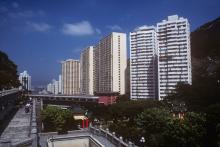70 years ago: Hong Kong's wartime diaries
13 Nov 1942, Barbara Anslow's diary
Submitted by Barbara Anslow on Mon, 2012-03-05 18:30Book / Document:Date(s) of events described:Fri, 13 Nov 1942Headlines that Germans have moved into unoccupied France to forestall Allies, which shows that there is some ground in rumours that we had made landings in Spain and Marseilles.
Tony Sanh has been taken off by Gendarmerie for swearing at one of them who flashed a torch in his face, and hasn't been heard of since. ((But he was OK))
The two Macintyre children, Ailso and Muriel, came into hospital with malaria, arrived on the same stretcher.
Goodwin and Simmonds of Gas Company came into camp. It is said that French Hospital moved to North Point, and Bowen Road Hosp (Military) to Gun Club Hill. ((False I think))
Choir practice tonight.
13 Nov 1942, R. E. Jones Wartime diary
Submitted by Admin on Wed, 2012-10-31 22:23Book / Document:Date(s) of events described:Fri, 13 Nov 194213 Nov 1942, Eric MacNider's wartime diary
Submitted by Old Man on Wed, 2014-10-29 21:23Book / Document:Date(s) of events described:Fri, 13 Nov 194213 Nov 1942, John Charter's wartime journal
Submitted by HK Bill on Tue, 2021-05-04 12:11Book / Document:Date(s) of events described:Fri, 13 Nov 1942My last entry was made on the Armistice Day Anniversary of the last World War. On the previous Sunday, 8th Nov., we had an Armistice Day Sunday Service. It was conducted by Revd E. Sandbach, he being chosen as the only person in camp who fought in the last war as a soldier. He gave an inspiring address; his theme being that the sacrifices of those who died in both the last war and in this were made in the faith and belief that they were setting the stage for a world at peace; that it is the duty of those who survive to see these sacrifices are not made in vain again and to dedicate oneself afresh to God and His kingdom on earth. Mr Sandbach read three of Rupert Booke’s poems and “We will remember them”. Wreathes and poppies made in camp were placed on many of the war graves. It must have been a sad day for many in this camp, living on the very battlefield on which their husbands and sons were killed and with their graves in their midst. All those that I know have been wonderfully plucky. We observed no 2 minutes silence on the 11th; I believe the 2 minutes silence has been discontinued in England since this second war began.
I have many memories of past Armistice Day observances: last year Y and I stood alone in the hills above Tytam reservoir, where we had taken our food for a picnic; I can remember the silent and crowded scene at St Giles Circus in London where we used to go from the Architectural Association, the motionless men on scaffolding and in the suspended cradles on the façade of an adjacent building, the two sounds of a flag flapping at half mast and the jingle of a horse shaking it’s bridle miles down New Oxford Street. I can remember the little service on the greenswood outside the estate office at Welwyn Garden City when an ex-army bugler sounded a somewhat uncertain “Last Post” on his old bugle. But during the last war I was too young to remember any lost individuals; it was, to me, far more a national and international day of remembrance. Now, alas, I shall associate Armistice Day with the loss of many good friends. Still, Armistice Day for this war has not yet been fixed and, who knows, we may yet have some more work to do.
News lately has been magnificent: the Germans virtually finished in Libya (one cannot fail to pay tribute in passing to the brilliant soldiering of the German General Rommel); that the Americans have landed and occupied many parts of French and Italian North Africa; that air raids have been continuing in Hong Kong chiefly over Kowloon and New Territories. We sometimes hear distant thuds and we hear and see on nearly all days planes buzzing about to the N.E. They are too high to identify markings, but the drone of the engines are different between the Americans and the Japanese planes and we spend our time listening and guessing. Harold saw three planes yesterday, unmistakably going down behind the hills in steep dives, one after the other. Anyway, the Japanese, who seem to be doing their best to keep out of the camp news of air raids, made a pretty naïve admission of them on Wednesday.
Last Friday morning the camp was buzzing with the incredulous rumour that all men between and including the ages of 21 and 34 were to be put in prison. After the lunch meal an official notice was posted which stated that men of these ages who had not got their wives in camp with them were to spend the hours between 6:30 p.m. and 7:00 a.m. in the prison.

